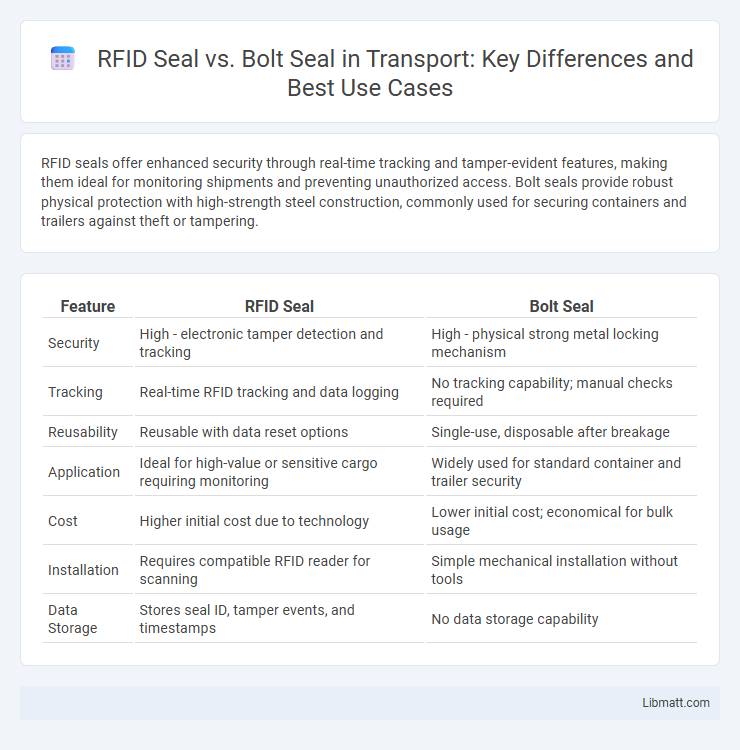RFID seals offer enhanced security through real-time tracking and tamper-evident features, making them ideal for monitoring shipments and preventing unauthorized access. Bolt seals provide robust physical protection with high-strength steel construction, commonly used for securing containers and trailers against theft or tampering.
Table of Comparison
| Feature | RFID Seal | Bolt Seal |
|---|---|---|
| Security | High - electronic tamper detection and tracking | High - physical strong metal locking mechanism |
| Tracking | Real-time RFID tracking and data logging | No tracking capability; manual checks required |
| Reusability | Reusable with data reset options | Single-use, disposable after breakage |
| Application | Ideal for high-value or sensitive cargo requiring monitoring | Widely used for standard container and trailer security |
| Cost | Higher initial cost due to technology | Lower initial cost; economical for bulk usage |
| Installation | Requires compatible RFID reader for scanning | Simple mechanical installation without tools |
| Data Storage | Stores seal ID, tamper events, and timestamps | No data storage capability |
Introduction to RFID Seals and Bolt Seals
RFID seals incorporate radio frequency identification technology, allowing real-time tracking and enhanced security for cargo and container shipments. Bolt seals provide robust physical protection through a high-strength locking mechanism designed to prevent unauthorized access during transit. Your choice between RFID seals and bolt seals depends on the level of monitoring required and the security standards needed for your shipments.
Definition and Components of RFID Seals
RFID seals are tamper-evident security devices equipped with embedded radio-frequency identification technology, enabling remote tracking and authentication of shipments. Their main components include a durable seal body, an RFID tag containing a microchip and antenna, and a locking mechanism that secures the seal in place. You can enhance supply chain security and streamline inspection processes by using RFID seals that offer real-time data capture, unlike traditional bolt seals which rely solely on mechanical locking and visual inspection.
Overview and Types of Bolt Seals
Bolt seals are high-security seals primarily used in shipping containers and trailers to prevent unauthorized access, available in various types including plastic-coated, metal-coated, and electronic RFID-enabled bolt seals. RFID seals incorporate radio-frequency identification technology for instant tracking and verification, enhancing security beyond traditional mechanical bolt seals. Both RFID and bolt seals ensure tamper-evidence, but RFID bolt seals offer added benefits such as real-time monitoring and inventory management in logistics operations.
Security Features: RFID Seal vs Bolt Seal
RFID seals offer enhanced security features through electronic tracking and tamper-evident technology, enabling real-time monitoring and quick identification of unauthorized access attempts. Bolt seals provide a robust physical barrier with high tensile strength steel, making them extremely resistant to cutting or tampering in heavy-duty applications. Combining RFID technology with bolt seals delivers both physical security and digital verification, optimizing cargo protection and chain-of-custody assurance.
Installation and Usage Differences
RFID seals enable quick electronic verification by reading embedded chips without physical inspection, while bolt seals require manual locking and visual inspection of metal components. Installing RFID seals typically involves snapping or adhesive attachment with minimal tools, contrasting with bolt seals that need physical insertion and securing of the bolt through locking mechanisms. RFID seals enhance efficiency in high-volume logistics environments, whereas bolt seals provide robust physical security for heavy-duty cargo shipments.
Tracking and Monitoring Capabilities
RFID seals provide advanced tracking and monitoring capabilities by enabling real-time data collection and remote verification through embedded electronic tags. Bolt seals offer a physical security measure but lack automated tracking features, requiring manual checks to confirm seal integrity. Your choice between RFID and bolt seals impacts the efficiency and accuracy of cargo monitoring throughout the supply chain.
Tamper Evidence and Detection
RFID seals provide advanced tamper evidence by incorporating electronic tracking that instantly signals unauthorized access or seal breaches, enhancing detection accuracy beyond visual inspection. Bolt seals offer robust physical security with strong metal construction designed to withstand cutting or breaking attempts, but rely primarily on manual inspection for tamper detection. Your choice depends on the need for real-time monitoring and electronic tamper alerts versus traditional, high-strength physical protection.
Cost Comparison: RFID Seal vs Bolt Seal
RFID seals typically incur higher upfront costs due to embedded electronic components and data tracking capabilities, whereas bolt seals are generally more affordable with simpler mechanical designs. Over time, RFID seals can reduce operational expenses by improving security and streamlining inventory management, offsetting their initial price premium. Bolt seals remain preferred for budget-conscious applications prioritizing basic tamper evidence without integrated tracking features.
Application Scenarios in Industry
RFID seals are widely used in logistics and supply chain management for real-time tracking and tamper detection of cargo containers, enhancing security and operational efficiency. Bolt seals are preferred in heavy-duty shipping and transportation sectors for securing high-value freight and preventing unauthorized access due to their robust physical strength. Both seals serve critical roles in industries requiring stringent security measures, but RFID seals offer advanced data capture and monitoring capabilities suitable for integrated asset management systems.
Choosing the Right Seal for Your Needs
Selecting the right security seal depends on the specific requirements of your cargo and supply chain. RFID seals offer advanced tracking and real-time monitoring, ideal for high-value shipments needing enhanced security and data visibility. Bolt seals provide robust physical protection and tamper evidence, making them suitable for securing containers where strong mechanical resistance is crucial.
RFID seal vs bolt seal Infographic

 libmatt.com
libmatt.com